Organisational Behaviour Report: ASDA, Individual and Team Dynamics
VerifiedAdded on 2023/01/11
|19
|7061
|57
Report
AI Summary
This report provides a comprehensive analysis of organisational behaviour, using ASDA as a case study. It explores the influence of organisational culture, power dynamics, and politics on individual and team behaviour and performance. The report delves into various types of organisational culture, including person, power, task, and role cultures, and evaluates their impact. It examines organisational power, including coercive and reward power, and their effects on employee motivation and performance. The report also assesses motivational theories, such as content and process theories, and their application in achieving organisational goals. Furthermore, it explores team development theories, comparing effective and ineffective team characteristics. Finally, the report applies organisational behaviour concepts and philosophies within the context of ASDA, evaluating their influence on behaviour in the workplace, and providing recommendations for fostering a positive and productive work environment. The report aims to highlight the importance of understanding organisational behaviour for enhancing individual and team performance and achieving organisational success.
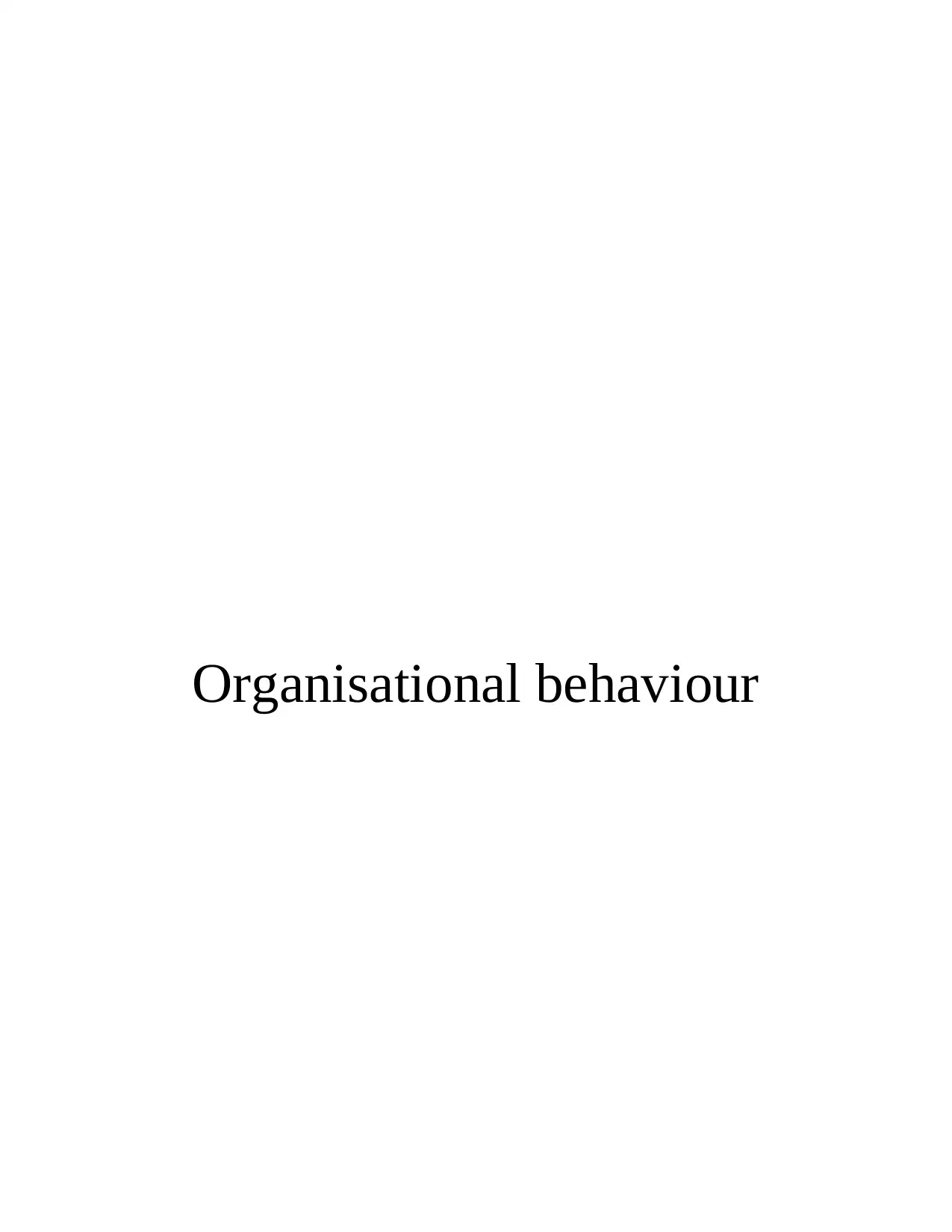
Organisational behaviour
Paraphrase This Document
Need a fresh take? Get an instant paraphrase of this document with our AI Paraphraser
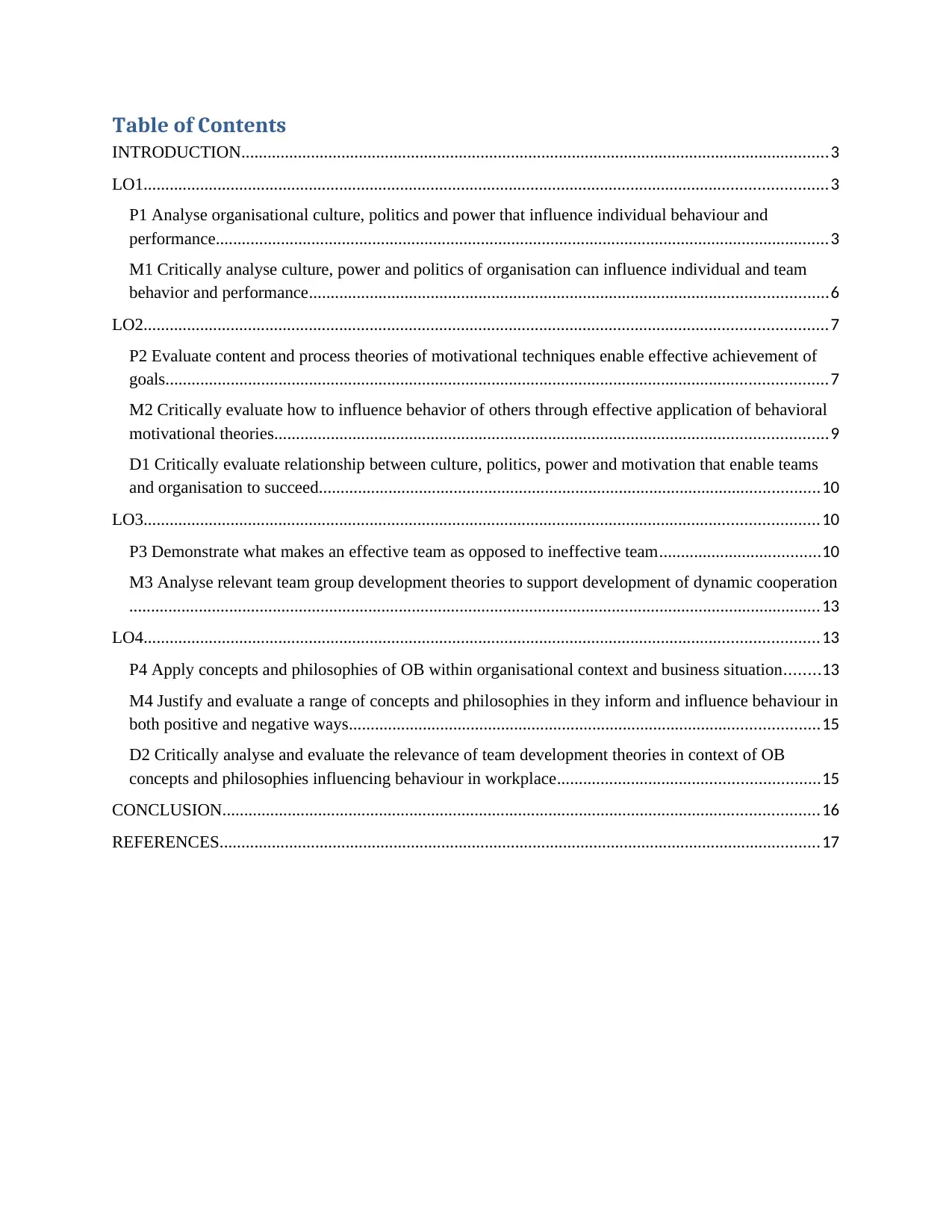
Table of Contents
INTRODUCTION.......................................................................................................................................3
LO1.............................................................................................................................................................3
P1 Analyse organisational culture, politics and power that influence individual behaviour and
performance.............................................................................................................................................3
M1 Critically analyse culture, power and politics of organisation can influence individual and team
behavior and performance.......................................................................................................................6
LO2.............................................................................................................................................................7
P2 Evaluate content and process theories of motivational techniques enable effective achievement of
goals........................................................................................................................................................7
M2 Critically evaluate how to influence behavior of others through effective application of behavioral
motivational theories...............................................................................................................................9
D1 Critically evaluate relationship between culture, politics, power and motivation that enable teams
and organisation to succeed...................................................................................................................10
LO3...........................................................................................................................................................10
P3 Demonstrate what makes an effective team as opposed to ineffective team.....................................10
M3 Analyse relevant team group development theories to support development of dynamic cooperation
...............................................................................................................................................................13
LO4...........................................................................................................................................................13
P4 Apply concepts and philosophies of OB within organisational context and business situation........13
M4 Justify and evaluate a range of concepts and philosophies in they inform and influence behaviour in
both positive and negative ways............................................................................................................15
D2 Critically analyse and evaluate the relevance of team development theories in context of OB
concepts and philosophies influencing behaviour in workplace............................................................15
CONCLUSION.........................................................................................................................................16
REFERENCES..........................................................................................................................................17
INTRODUCTION.......................................................................................................................................3
LO1.............................................................................................................................................................3
P1 Analyse organisational culture, politics and power that influence individual behaviour and
performance.............................................................................................................................................3
M1 Critically analyse culture, power and politics of organisation can influence individual and team
behavior and performance.......................................................................................................................6
LO2.............................................................................................................................................................7
P2 Evaluate content and process theories of motivational techniques enable effective achievement of
goals........................................................................................................................................................7
M2 Critically evaluate how to influence behavior of others through effective application of behavioral
motivational theories...............................................................................................................................9
D1 Critically evaluate relationship between culture, politics, power and motivation that enable teams
and organisation to succeed...................................................................................................................10
LO3...........................................................................................................................................................10
P3 Demonstrate what makes an effective team as opposed to ineffective team.....................................10
M3 Analyse relevant team group development theories to support development of dynamic cooperation
...............................................................................................................................................................13
LO4...........................................................................................................................................................13
P4 Apply concepts and philosophies of OB within organisational context and business situation........13
M4 Justify and evaluate a range of concepts and philosophies in they inform and influence behaviour in
both positive and negative ways............................................................................................................15
D2 Critically analyse and evaluate the relevance of team development theories in context of OB
concepts and philosophies influencing behaviour in workplace............................................................15
CONCLUSION.........................................................................................................................................16
REFERENCES..........................................................................................................................................17
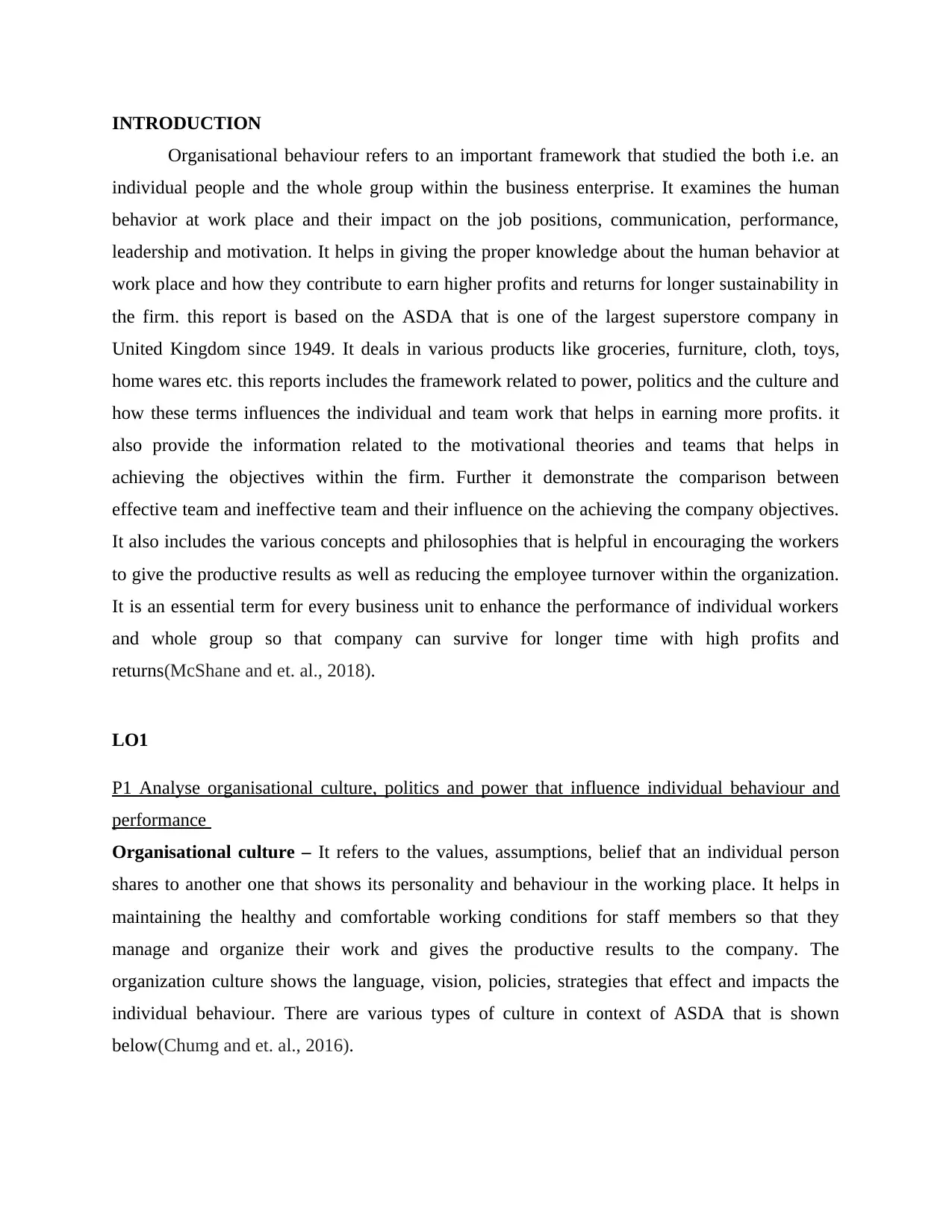
INTRODUCTION
Organisational behaviour refers to an important framework that studied the both i.e. an
individual people and the whole group within the business enterprise. It examines the human
behavior at work place and their impact on the job positions, communication, performance,
leadership and motivation. It helps in giving the proper knowledge about the human behavior at
work place and how they contribute to earn higher profits and returns for longer sustainability in
the firm. this report is based on the ASDA that is one of the largest superstore company in
United Kingdom since 1949. It deals in various products like groceries, furniture, cloth, toys,
home wares etc. this reports includes the framework related to power, politics and the culture and
how these terms influences the individual and team work that helps in earning more profits. it
also provide the information related to the motivational theories and teams that helps in
achieving the objectives within the firm. Further it demonstrate the comparison between
effective team and ineffective team and their influence on the achieving the company objectives.
It also includes the various concepts and philosophies that is helpful in encouraging the workers
to give the productive results as well as reducing the employee turnover within the organization.
It is an essential term for every business unit to enhance the performance of individual workers
and whole group so that company can survive for longer time with high profits and
returns(McShane and et. al., 2018).
LO1
P1 Analyse organisational culture, politics and power that influence individual behaviour and
performance
Organisational culture – It refers to the values, assumptions, belief that an individual person
shares to another one that shows its personality and behaviour in the working place. It helps in
maintaining the healthy and comfortable working conditions for staff members so that they
manage and organize their work and gives the productive results to the company. The
organization culture shows the language, vision, policies, strategies that effect and impacts the
individual behaviour. There are various types of culture in context of ASDA that is shown
below(Chumg and et. al., 2016).
Organisational behaviour refers to an important framework that studied the both i.e. an
individual people and the whole group within the business enterprise. It examines the human
behavior at work place and their impact on the job positions, communication, performance,
leadership and motivation. It helps in giving the proper knowledge about the human behavior at
work place and how they contribute to earn higher profits and returns for longer sustainability in
the firm. this report is based on the ASDA that is one of the largest superstore company in
United Kingdom since 1949. It deals in various products like groceries, furniture, cloth, toys,
home wares etc. this reports includes the framework related to power, politics and the culture and
how these terms influences the individual and team work that helps in earning more profits. it
also provide the information related to the motivational theories and teams that helps in
achieving the objectives within the firm. Further it demonstrate the comparison between
effective team and ineffective team and their influence on the achieving the company objectives.
It also includes the various concepts and philosophies that is helpful in encouraging the workers
to give the productive results as well as reducing the employee turnover within the organization.
It is an essential term for every business unit to enhance the performance of individual workers
and whole group so that company can survive for longer time with high profits and
returns(McShane and et. al., 2018).
LO1
P1 Analyse organisational culture, politics and power that influence individual behaviour and
performance
Organisational culture – It refers to the values, assumptions, belief that an individual person
shares to another one that shows its personality and behaviour in the working place. It helps in
maintaining the healthy and comfortable working conditions for staff members so that they
manage and organize their work and gives the productive results to the company. The
organization culture shows the language, vision, policies, strategies that effect and impacts the
individual behaviour. There are various types of culture in context of ASDA that is shown
below(Chumg and et. al., 2016).
⊘ This is a preview!⊘
Do you want full access?
Subscribe today to unlock all pages.

Trusted by 1+ million students worldwide
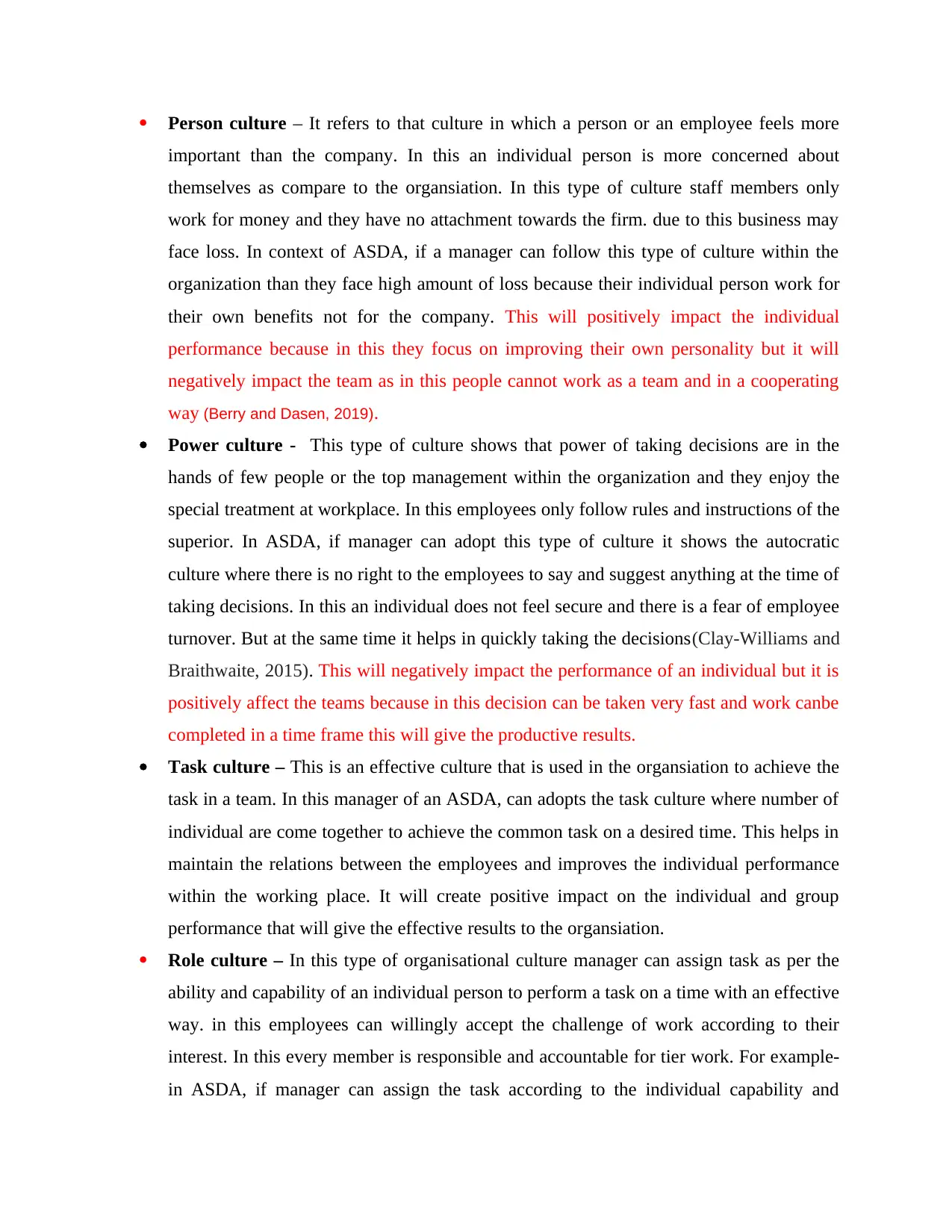
Person culture – It refers to that culture in which a person or an employee feels more
important than the company. In this an individual person is more concerned about
themselves as compare to the organsiation. In this type of culture staff members only
work for money and they have no attachment towards the firm. due to this business may
face loss. In context of ASDA, if a manager can follow this type of culture within the
organization than they face high amount of loss because their individual person work for
their own benefits not for the company. This will positively impact the individual
performance because in this they focus on improving their own personality but it will
negatively impact the team as in this people cannot work as a team and in a cooperating
way (Berry and Dasen, 2019).
Power culture - This type of culture shows that power of taking decisions are in the
hands of few people or the top management within the organization and they enjoy the
special treatment at workplace. In this employees only follow rules and instructions of the
superior. In ASDA, if manager can adopt this type of culture it shows the autocratic
culture where there is no right to the employees to say and suggest anything at the time of
taking decisions. In this an individual does not feel secure and there is a fear of employee
turnover. But at the same time it helps in quickly taking the decisions(Clay-Williams and
Braithwaite, 2015). This will negatively impact the performance of an individual but it is
positively affect the teams because in this decision can be taken very fast and work canbe
completed in a time frame this will give the productive results.
Task culture – This is an effective culture that is used in the organsiation to achieve the
task in a team. In this manager of an ASDA, can adopts the task culture where number of
individual are come together to achieve the common task on a desired time. This helps in
maintain the relations between the employees and improves the individual performance
within the working place. It will create positive impact on the individual and group
performance that will give the effective results to the organsiation.
Role culture – In this type of organisational culture manager can assign task as per the
ability and capability of an individual person to perform a task on a time with an effective
way. in this employees can willingly accept the challenge of work according to their
interest. In this every member is responsible and accountable for tier work. For example-
in ASDA, if manager can assign the task according to the individual capability and
important than the company. In this an individual person is more concerned about
themselves as compare to the organsiation. In this type of culture staff members only
work for money and they have no attachment towards the firm. due to this business may
face loss. In context of ASDA, if a manager can follow this type of culture within the
organization than they face high amount of loss because their individual person work for
their own benefits not for the company. This will positively impact the individual
performance because in this they focus on improving their own personality but it will
negatively impact the team as in this people cannot work as a team and in a cooperating
way (Berry and Dasen, 2019).
Power culture - This type of culture shows that power of taking decisions are in the
hands of few people or the top management within the organization and they enjoy the
special treatment at workplace. In this employees only follow rules and instructions of the
superior. In ASDA, if manager can adopt this type of culture it shows the autocratic
culture where there is no right to the employees to say and suggest anything at the time of
taking decisions. In this an individual does not feel secure and there is a fear of employee
turnover. But at the same time it helps in quickly taking the decisions(Clay-Williams and
Braithwaite, 2015). This will negatively impact the performance of an individual but it is
positively affect the teams because in this decision can be taken very fast and work canbe
completed in a time frame this will give the productive results.
Task culture – This is an effective culture that is used in the organsiation to achieve the
task in a team. In this manager of an ASDA, can adopts the task culture where number of
individual are come together to achieve the common task on a desired time. This helps in
maintain the relations between the employees and improves the individual performance
within the working place. It will create positive impact on the individual and group
performance that will give the effective results to the organsiation.
Role culture – In this type of organisational culture manager can assign task as per the
ability and capability of an individual person to perform a task on a time with an effective
way. in this employees can willingly accept the challenge of work according to their
interest. In this every member is responsible and accountable for tier work. For example-
in ASDA, if manager can assign the task according to the individual capability and
Paraphrase This Document
Need a fresh take? Get an instant paraphrase of this document with our AI Paraphraser
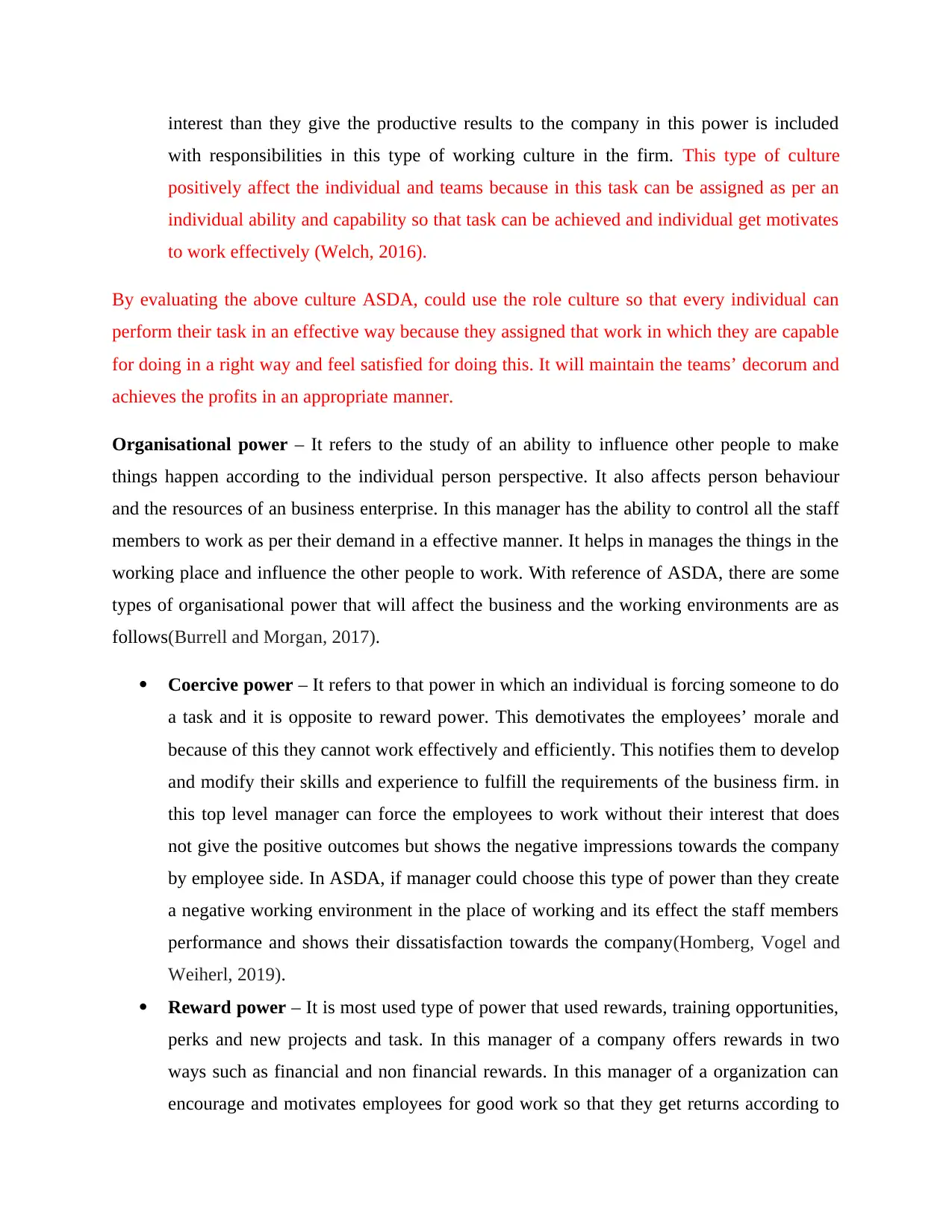
interest than they give the productive results to the company in this power is included
with responsibilities in this type of working culture in the firm. This type of culture
positively affect the individual and teams because in this task can be assigned as per an
individual ability and capability so that task can be achieved and individual get motivates
to work effectively (Welch, 2016).
By evaluating the above culture ASDA, could use the role culture so that every individual can
perform their task in an effective way because they assigned that work in which they are capable
for doing in a right way and feel satisfied for doing this. It will maintain the teams’ decorum and
achieves the profits in an appropriate manner.
Organisational power – It refers to the study of an ability to influence other people to make
things happen according to the individual person perspective. It also affects person behaviour
and the resources of an business enterprise. In this manager has the ability to control all the staff
members to work as per their demand in a effective manner. It helps in manages the things in the
working place and influence the other people to work. With reference of ASDA, there are some
types of organisational power that will affect the business and the working environments are as
follows(Burrell and Morgan, 2017).
Coercive power – It refers to that power in which an individual is forcing someone to do
a task and it is opposite to reward power. This demotivates the employees’ morale and
because of this they cannot work effectively and efficiently. This notifies them to develop
and modify their skills and experience to fulfill the requirements of the business firm. in
this top level manager can force the employees to work without their interest that does
not give the positive outcomes but shows the negative impressions towards the company
by employee side. In ASDA, if manager could choose this type of power than they create
a negative working environment in the place of working and its effect the staff members
performance and shows their dissatisfaction towards the company(Homberg, Vogel and
Weiherl, 2019).
Reward power – It is most used type of power that used rewards, training opportunities,
perks and new projects and task. In this manager of a company offers rewards in two
ways such as financial and non financial rewards. In this manager of a organization can
encourage and motivates employees for good work so that they get returns according to
with responsibilities in this type of working culture in the firm. This type of culture
positively affect the individual and teams because in this task can be assigned as per an
individual ability and capability so that task can be achieved and individual get motivates
to work effectively (Welch, 2016).
By evaluating the above culture ASDA, could use the role culture so that every individual can
perform their task in an effective way because they assigned that work in which they are capable
for doing in a right way and feel satisfied for doing this. It will maintain the teams’ decorum and
achieves the profits in an appropriate manner.
Organisational power – It refers to the study of an ability to influence other people to make
things happen according to the individual person perspective. It also affects person behaviour
and the resources of an business enterprise. In this manager has the ability to control all the staff
members to work as per their demand in a effective manner. It helps in manages the things in the
working place and influence the other people to work. With reference of ASDA, there are some
types of organisational power that will affect the business and the working environments are as
follows(Burrell and Morgan, 2017).
Coercive power – It refers to that power in which an individual is forcing someone to do
a task and it is opposite to reward power. This demotivates the employees’ morale and
because of this they cannot work effectively and efficiently. This notifies them to develop
and modify their skills and experience to fulfill the requirements of the business firm. in
this top level manager can force the employees to work without their interest that does
not give the positive outcomes but shows the negative impressions towards the company
by employee side. In ASDA, if manager could choose this type of power than they create
a negative working environment in the place of working and its effect the staff members
performance and shows their dissatisfaction towards the company(Homberg, Vogel and
Weiherl, 2019).
Reward power – It is most used type of power that used rewards, training opportunities,
perks and new projects and task. In this manager of a company offers rewards in two
ways such as financial and non financial rewards. In this manager of a organization can
encourage and motivates employees for good work so that they get returns according to
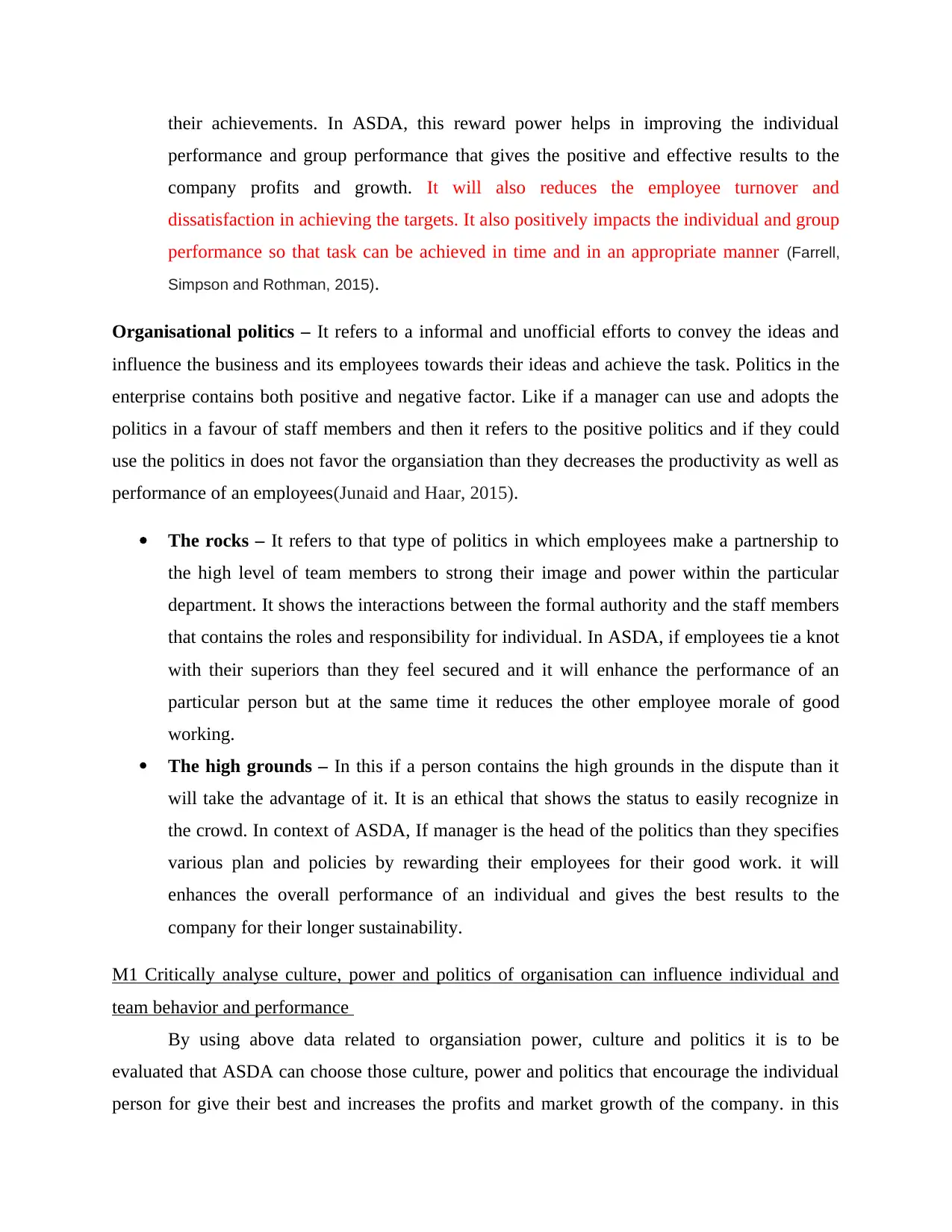
their achievements. In ASDA, this reward power helps in improving the individual
performance and group performance that gives the positive and effective results to the
company profits and growth. It will also reduces the employee turnover and
dissatisfaction in achieving the targets. It also positively impacts the individual and group
performance so that task can be achieved in time and in an appropriate manner (Farrell,
Simpson and Rothman, 2015).
Organisational politics – It refers to a informal and unofficial efforts to convey the ideas and
influence the business and its employees towards their ideas and achieve the task. Politics in the
enterprise contains both positive and negative factor. Like if a manager can use and adopts the
politics in a favour of staff members and then it refers to the positive politics and if they could
use the politics in does not favor the organsiation than they decreases the productivity as well as
performance of an employees(Junaid and Haar, 2015).
The rocks – It refers to that type of politics in which employees make a partnership to
the high level of team members to strong their image and power within the particular
department. It shows the interactions between the formal authority and the staff members
that contains the roles and responsibility for individual. In ASDA, if employees tie a knot
with their superiors than they feel secured and it will enhance the performance of an
particular person but at the same time it reduces the other employee morale of good
working.
The high grounds – In this if a person contains the high grounds in the dispute than it
will take the advantage of it. It is an ethical that shows the status to easily recognize in
the crowd. In context of ASDA, If manager is the head of the politics than they specifies
various plan and policies by rewarding their employees for their good work. it will
enhances the overall performance of an individual and gives the best results to the
company for their longer sustainability.
M1 Critically analyse culture, power and politics of organisation can influence individual and
team behavior and performance
By using above data related to organsiation power, culture and politics it is to be
evaluated that ASDA can choose those culture, power and politics that encourage the individual
person for give their best and increases the profits and market growth of the company. in this
performance and group performance that gives the positive and effective results to the
company profits and growth. It will also reduces the employee turnover and
dissatisfaction in achieving the targets. It also positively impacts the individual and group
performance so that task can be achieved in time and in an appropriate manner (Farrell,
Simpson and Rothman, 2015).
Organisational politics – It refers to a informal and unofficial efforts to convey the ideas and
influence the business and its employees towards their ideas and achieve the task. Politics in the
enterprise contains both positive and negative factor. Like if a manager can use and adopts the
politics in a favour of staff members and then it refers to the positive politics and if they could
use the politics in does not favor the organsiation than they decreases the productivity as well as
performance of an employees(Junaid and Haar, 2015).
The rocks – It refers to that type of politics in which employees make a partnership to
the high level of team members to strong their image and power within the particular
department. It shows the interactions between the formal authority and the staff members
that contains the roles and responsibility for individual. In ASDA, if employees tie a knot
with their superiors than they feel secured and it will enhance the performance of an
particular person but at the same time it reduces the other employee morale of good
working.
The high grounds – In this if a person contains the high grounds in the dispute than it
will take the advantage of it. It is an ethical that shows the status to easily recognize in
the crowd. In context of ASDA, If manager is the head of the politics than they specifies
various plan and policies by rewarding their employees for their good work. it will
enhances the overall performance of an individual and gives the best results to the
company for their longer sustainability.
M1 Critically analyse culture, power and politics of organisation can influence individual and
team behavior and performance
By using above data related to organsiation power, culture and politics it is to be
evaluated that ASDA can choose those culture, power and politics that encourage the individual
person for give their best and increases the profits and market growth of the company. in this
⊘ This is a preview!⊘
Do you want full access?
Subscribe today to unlock all pages.

Trusted by 1+ million students worldwide
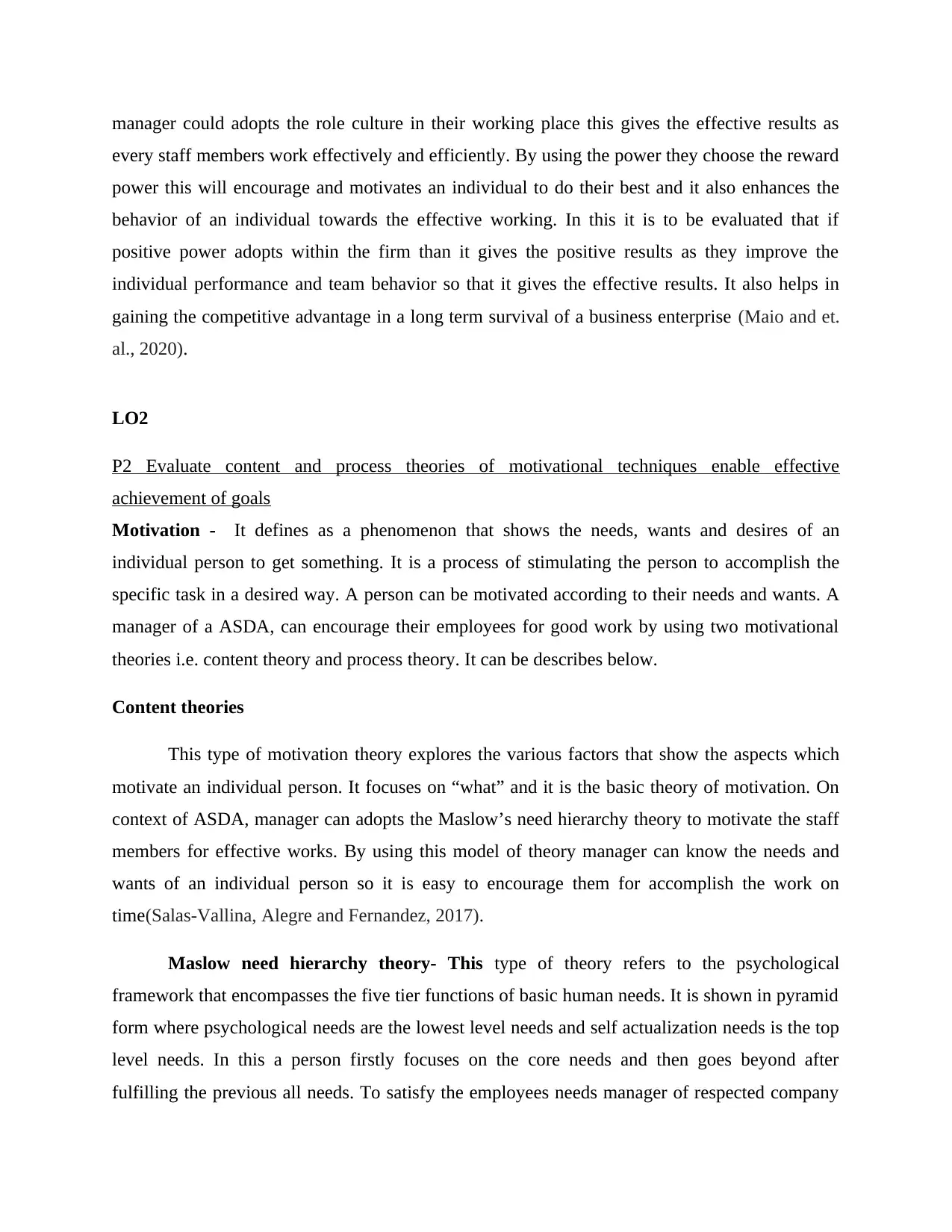
manager could adopts the role culture in their working place this gives the effective results as
every staff members work effectively and efficiently. By using the power they choose the reward
power this will encourage and motivates an individual to do their best and it also enhances the
behavior of an individual towards the effective working. In this it is to be evaluated that if
positive power adopts within the firm than it gives the positive results as they improve the
individual performance and team behavior so that it gives the effective results. It also helps in
gaining the competitive advantage in a long term survival of a business enterprise (Maio and et.
al., 2020).
LO2
P2 Evaluate content and process theories of motivational techniques enable effective
achievement of goals
Motivation - It defines as a phenomenon that shows the needs, wants and desires of an
individual person to get something. It is a process of stimulating the person to accomplish the
specific task in a desired way. A person can be motivated according to their needs and wants. A
manager of a ASDA, can encourage their employees for good work by using two motivational
theories i.e. content theory and process theory. It can be describes below.
Content theories
This type of motivation theory explores the various factors that show the aspects which
motivate an individual person. It focuses on “what” and it is the basic theory of motivation. On
context of ASDA, manager can adopts the Maslow’s need hierarchy theory to motivate the staff
members for effective works. By using this model of theory manager can know the needs and
wants of an individual person so it is easy to encourage them for accomplish the work on
time(Salas-Vallina, Alegre and Fernandez, 2017).
Maslow need hierarchy theory- This type of theory refers to the psychological
framework that encompasses the five tier functions of basic human needs. It is shown in pyramid
form where psychological needs are the lowest level needs and self actualization needs is the top
level needs. In this a person firstly focuses on the core needs and then goes beyond after
fulfilling the previous all needs. To satisfy the employees needs manager of respected company
every staff members work effectively and efficiently. By using the power they choose the reward
power this will encourage and motivates an individual to do their best and it also enhances the
behavior of an individual towards the effective working. In this it is to be evaluated that if
positive power adopts within the firm than it gives the positive results as they improve the
individual performance and team behavior so that it gives the effective results. It also helps in
gaining the competitive advantage in a long term survival of a business enterprise (Maio and et.
al., 2020).
LO2
P2 Evaluate content and process theories of motivational techniques enable effective
achievement of goals
Motivation - It defines as a phenomenon that shows the needs, wants and desires of an
individual person to get something. It is a process of stimulating the person to accomplish the
specific task in a desired way. A person can be motivated according to their needs and wants. A
manager of a ASDA, can encourage their employees for good work by using two motivational
theories i.e. content theory and process theory. It can be describes below.
Content theories
This type of motivation theory explores the various factors that show the aspects which
motivate an individual person. It focuses on “what” and it is the basic theory of motivation. On
context of ASDA, manager can adopts the Maslow’s need hierarchy theory to motivate the staff
members for effective works. By using this model of theory manager can know the needs and
wants of an individual person so it is easy to encourage them for accomplish the work on
time(Salas-Vallina, Alegre and Fernandez, 2017).
Maslow need hierarchy theory- This type of theory refers to the psychological
framework that encompasses the five tier functions of basic human needs. It is shown in pyramid
form where psychological needs are the lowest level needs and self actualization needs is the top
level needs. In this a person firstly focuses on the core needs and then goes beyond after
fulfilling the previous all needs. To satisfy the employees needs manager of respected company
Paraphrase This Document
Need a fresh take? Get an instant paraphrase of this document with our AI Paraphraser
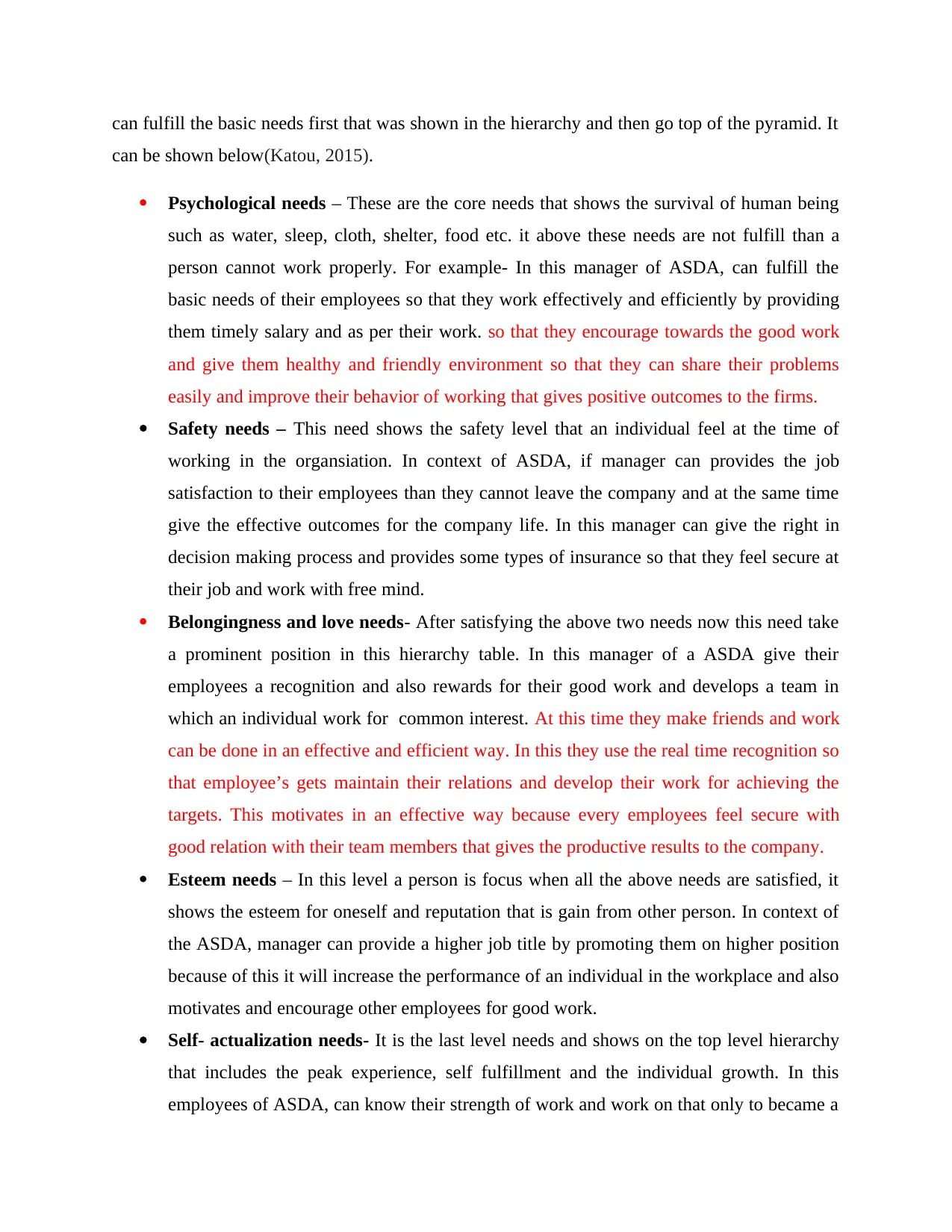
can fulfill the basic needs first that was shown in the hierarchy and then go top of the pyramid. It
can be shown below(Katou, 2015).
Psychological needs – These are the core needs that shows the survival of human being
such as water, sleep, cloth, shelter, food etc. it above these needs are not fulfill than a
person cannot work properly. For example- In this manager of ASDA, can fulfill the
basic needs of their employees so that they work effectively and efficiently by providing
them timely salary and as per their work. so that they encourage towards the good work
and give them healthy and friendly environment so that they can share their problems
easily and improve their behavior of working that gives positive outcomes to the firms.
Safety needs – This need shows the safety level that an individual feel at the time of
working in the organsiation. In context of ASDA, if manager can provides the job
satisfaction to their employees than they cannot leave the company and at the same time
give the effective outcomes for the company life. In this manager can give the right in
decision making process and provides some types of insurance so that they feel secure at
their job and work with free mind.
Belongingness and love needs- After satisfying the above two needs now this need take
a prominent position in this hierarchy table. In this manager of a ASDA give their
employees a recognition and also rewards for their good work and develops a team in
which an individual work for common interest. At this time they make friends and work
can be done in an effective and efficient way. In this they use the real time recognition so
that employee’s gets maintain their relations and develop their work for achieving the
targets. This motivates in an effective way because every employees feel secure with
good relation with their team members that gives the productive results to the company.
Esteem needs – In this level a person is focus when all the above needs are satisfied, it
shows the esteem for oneself and reputation that is gain from other person. In context of
the ASDA, manager can provide a higher job title by promoting them on higher position
because of this it will increase the performance of an individual in the workplace and also
motivates and encourage other employees for good work.
Self- actualization needs- It is the last level needs and shows on the top level hierarchy
that includes the peak experience, self fulfillment and the individual growth. In this
employees of ASDA, can know their strength of work and work on that only to became a
can be shown below(Katou, 2015).
Psychological needs – These are the core needs that shows the survival of human being
such as water, sleep, cloth, shelter, food etc. it above these needs are not fulfill than a
person cannot work properly. For example- In this manager of ASDA, can fulfill the
basic needs of their employees so that they work effectively and efficiently by providing
them timely salary and as per their work. so that they encourage towards the good work
and give them healthy and friendly environment so that they can share their problems
easily and improve their behavior of working that gives positive outcomes to the firms.
Safety needs – This need shows the safety level that an individual feel at the time of
working in the organsiation. In context of ASDA, if manager can provides the job
satisfaction to their employees than they cannot leave the company and at the same time
give the effective outcomes for the company life. In this manager can give the right in
decision making process and provides some types of insurance so that they feel secure at
their job and work with free mind.
Belongingness and love needs- After satisfying the above two needs now this need take
a prominent position in this hierarchy table. In this manager of a ASDA give their
employees a recognition and also rewards for their good work and develops a team in
which an individual work for common interest. At this time they make friends and work
can be done in an effective and efficient way. In this they use the real time recognition so
that employee’s gets maintain their relations and develop their work for achieving the
targets. This motivates in an effective way because every employees feel secure with
good relation with their team members that gives the productive results to the company.
Esteem needs – In this level a person is focus when all the above needs are satisfied, it
shows the esteem for oneself and reputation that is gain from other person. In context of
the ASDA, manager can provide a higher job title by promoting them on higher position
because of this it will increase the performance of an individual in the workplace and also
motivates and encourage other employees for good work.
Self- actualization needs- It is the last level needs and shows on the top level hierarchy
that includes the peak experience, self fulfillment and the individual growth. In this
employees of ASDA, can know their strength of work and work on that only to became a
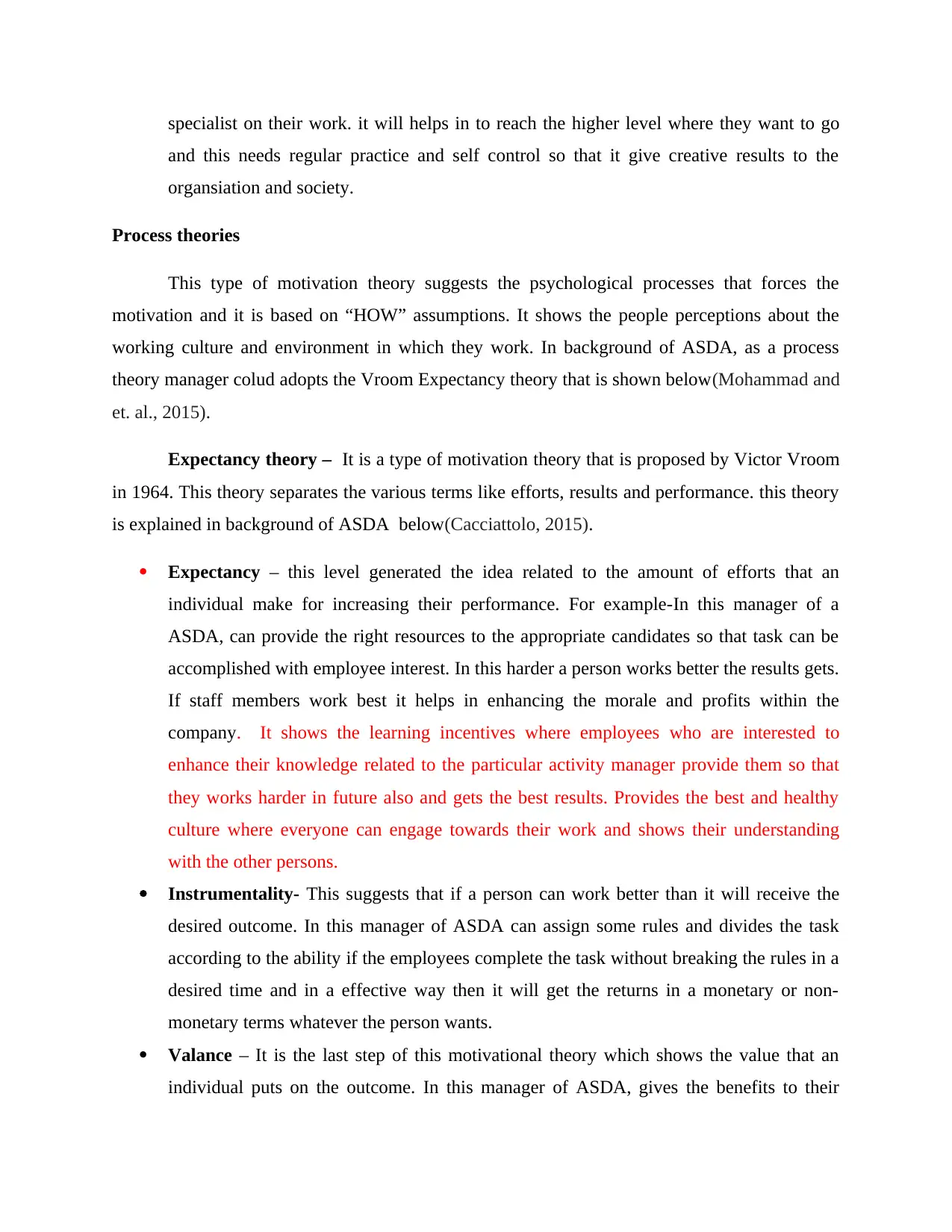
specialist on their work. it will helps in to reach the higher level where they want to go
and this needs regular practice and self control so that it give creative results to the
organsiation and society.
Process theories
This type of motivation theory suggests the psychological processes that forces the
motivation and it is based on “HOW” assumptions. It shows the people perceptions about the
working culture and environment in which they work. In background of ASDA, as a process
theory manager colud adopts the Vroom Expectancy theory that is shown below(Mohammad and
et. al., 2015).
Expectancy theory – It is a type of motivation theory that is proposed by Victor Vroom
in 1964. This theory separates the various terms like efforts, results and performance. this theory
is explained in background of ASDA below(Cacciattolo, 2015).
Expectancy – this level generated the idea related to the amount of efforts that an
individual make for increasing their performance. For example-In this manager of a
ASDA, can provide the right resources to the appropriate candidates so that task can be
accomplished with employee interest. In this harder a person works better the results gets.
If staff members work best it helps in enhancing the morale and profits within the
company. It shows the learning incentives where employees who are interested to
enhance their knowledge related to the particular activity manager provide them so that
they works harder in future also and gets the best results. Provides the best and healthy
culture where everyone can engage towards their work and shows their understanding
with the other persons.
Instrumentality- This suggests that if a person can work better than it will receive the
desired outcome. In this manager of ASDA can assign some rules and divides the task
according to the ability if the employees complete the task without breaking the rules in a
desired time and in a effective way then it will get the returns in a monetary or non-
monetary terms whatever the person wants.
Valance – It is the last step of this motivational theory which shows the value that an
individual puts on the outcome. In this manager of ASDA, gives the benefits to their
and this needs regular practice and self control so that it give creative results to the
organsiation and society.
Process theories
This type of motivation theory suggests the psychological processes that forces the
motivation and it is based on “HOW” assumptions. It shows the people perceptions about the
working culture and environment in which they work. In background of ASDA, as a process
theory manager colud adopts the Vroom Expectancy theory that is shown below(Mohammad and
et. al., 2015).
Expectancy theory – It is a type of motivation theory that is proposed by Victor Vroom
in 1964. This theory separates the various terms like efforts, results and performance. this theory
is explained in background of ASDA below(Cacciattolo, 2015).
Expectancy – this level generated the idea related to the amount of efforts that an
individual make for increasing their performance. For example-In this manager of a
ASDA, can provide the right resources to the appropriate candidates so that task can be
accomplished with employee interest. In this harder a person works better the results gets.
If staff members work best it helps in enhancing the morale and profits within the
company. It shows the learning incentives where employees who are interested to
enhance their knowledge related to the particular activity manager provide them so that
they works harder in future also and gets the best results. Provides the best and healthy
culture where everyone can engage towards their work and shows their understanding
with the other persons.
Instrumentality- This suggests that if a person can work better than it will receive the
desired outcome. In this manager of ASDA can assign some rules and divides the task
according to the ability if the employees complete the task without breaking the rules in a
desired time and in a effective way then it will get the returns in a monetary or non-
monetary terms whatever the person wants.
Valance – It is the last step of this motivational theory which shows the value that an
individual puts on the outcome. In this manager of ASDA, gives the benefits to their
⊘ This is a preview!⊘
Do you want full access?
Subscribe today to unlock all pages.

Trusted by 1+ million students worldwide
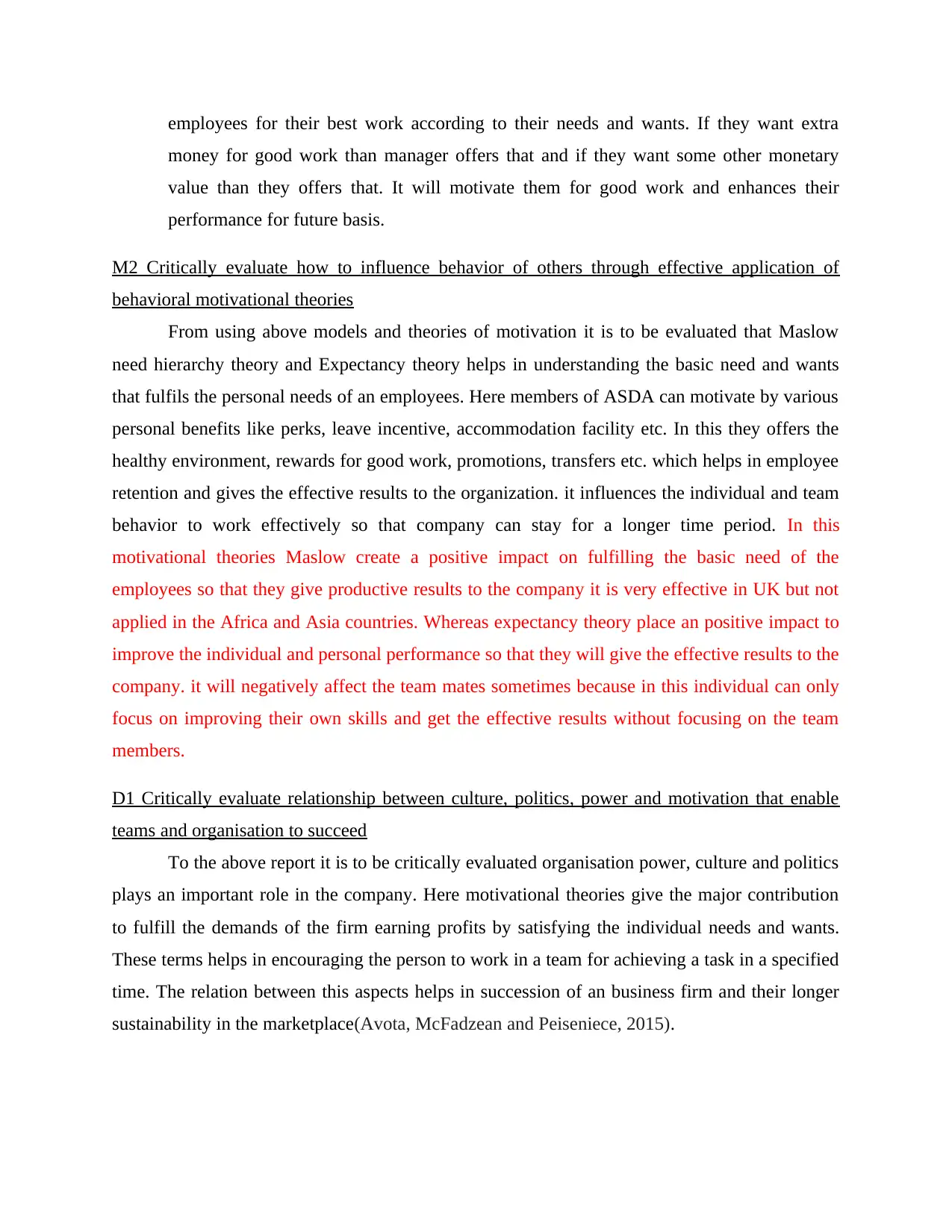
employees for their best work according to their needs and wants. If they want extra
money for good work than manager offers that and if they want some other monetary
value than they offers that. It will motivate them for good work and enhances their
performance for future basis.
M2 Critically evaluate how to influence behavior of others through effective application of
behavioral motivational theories
From using above models and theories of motivation it is to be evaluated that Maslow
need hierarchy theory and Expectancy theory helps in understanding the basic need and wants
that fulfils the personal needs of an employees. Here members of ASDA can motivate by various
personal benefits like perks, leave incentive, accommodation facility etc. In this they offers the
healthy environment, rewards for good work, promotions, transfers etc. which helps in employee
retention and gives the effective results to the organization. it influences the individual and team
behavior to work effectively so that company can stay for a longer time period. In this
motivational theories Maslow create a positive impact on fulfilling the basic need of the
employees so that they give productive results to the company it is very effective in UK but not
applied in the Africa and Asia countries. Whereas expectancy theory place an positive impact to
improve the individual and personal performance so that they will give the effective results to the
company. it will negatively affect the team mates sometimes because in this individual can only
focus on improving their own skills and get the effective results without focusing on the team
members.
D1 Critically evaluate relationship between culture, politics, power and motivation that enable
teams and organisation to succeed
To the above report it is to be critically evaluated organisation power, culture and politics
plays an important role in the company. Here motivational theories give the major contribution
to fulfill the demands of the firm earning profits by satisfying the individual needs and wants.
These terms helps in encouraging the person to work in a team for achieving a task in a specified
time. The relation between this aspects helps in succession of an business firm and their longer
sustainability in the marketplace(Avota, McFadzean and Peiseniece, 2015).
money for good work than manager offers that and if they want some other monetary
value than they offers that. It will motivate them for good work and enhances their
performance for future basis.
M2 Critically evaluate how to influence behavior of others through effective application of
behavioral motivational theories
From using above models and theories of motivation it is to be evaluated that Maslow
need hierarchy theory and Expectancy theory helps in understanding the basic need and wants
that fulfils the personal needs of an employees. Here members of ASDA can motivate by various
personal benefits like perks, leave incentive, accommodation facility etc. In this they offers the
healthy environment, rewards for good work, promotions, transfers etc. which helps in employee
retention and gives the effective results to the organization. it influences the individual and team
behavior to work effectively so that company can stay for a longer time period. In this
motivational theories Maslow create a positive impact on fulfilling the basic need of the
employees so that they give productive results to the company it is very effective in UK but not
applied in the Africa and Asia countries. Whereas expectancy theory place an positive impact to
improve the individual and personal performance so that they will give the effective results to the
company. it will negatively affect the team mates sometimes because in this individual can only
focus on improving their own skills and get the effective results without focusing on the team
members.
D1 Critically evaluate relationship between culture, politics, power and motivation that enable
teams and organisation to succeed
To the above report it is to be critically evaluated organisation power, culture and politics
plays an important role in the company. Here motivational theories give the major contribution
to fulfill the demands of the firm earning profits by satisfying the individual needs and wants.
These terms helps in encouraging the person to work in a team for achieving a task in a specified
time. The relation between this aspects helps in succession of an business firm and their longer
sustainability in the marketplace(Avota, McFadzean and Peiseniece, 2015).
Paraphrase This Document
Need a fresh take? Get an instant paraphrase of this document with our AI Paraphraser
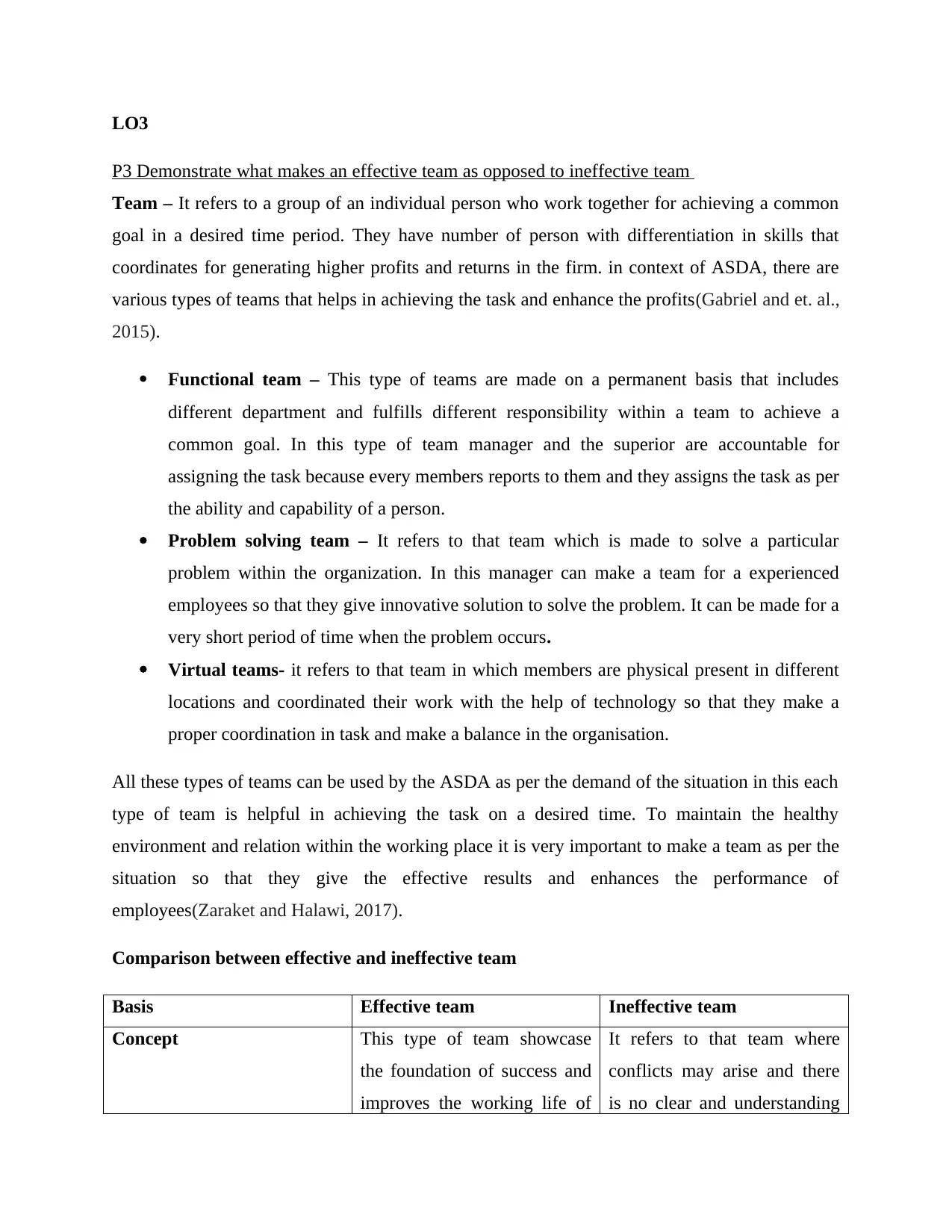
LO3
P3 Demonstrate what makes an effective team as opposed to ineffective team
Team – It refers to a group of an individual person who work together for achieving a common
goal in a desired time period. They have number of person with differentiation in skills that
coordinates for generating higher profits and returns in the firm. in context of ASDA, there are
various types of teams that helps in achieving the task and enhance the profits(Gabriel and et. al.,
2015).
Functional team – This type of teams are made on a permanent basis that includes
different department and fulfills different responsibility within a team to achieve a
common goal. In this type of team manager and the superior are accountable for
assigning the task because every members reports to them and they assigns the task as per
the ability and capability of a person.
Problem solving team – It refers to that team which is made to solve a particular
problem within the organization. In this manager can make a team for a experienced
employees so that they give innovative solution to solve the problem. It can be made for a
very short period of time when the problem occurs.
Virtual teams- it refers to that team in which members are physical present in different
locations and coordinated their work with the help of technology so that they make a
proper coordination in task and make a balance in the organisation.
All these types of teams can be used by the ASDA as per the demand of the situation in this each
type of team is helpful in achieving the task on a desired time. To maintain the healthy
environment and relation within the working place it is very important to make a team as per the
situation so that they give the effective results and enhances the performance of
employees(Zaraket and Halawi, 2017).
Comparison between effective and ineffective team
Basis Effective team Ineffective team
Concept This type of team showcase
the foundation of success and
improves the working life of
It refers to that team where
conflicts may arise and there
is no clear and understanding
P3 Demonstrate what makes an effective team as opposed to ineffective team
Team – It refers to a group of an individual person who work together for achieving a common
goal in a desired time period. They have number of person with differentiation in skills that
coordinates for generating higher profits and returns in the firm. in context of ASDA, there are
various types of teams that helps in achieving the task and enhance the profits(Gabriel and et. al.,
2015).
Functional team – This type of teams are made on a permanent basis that includes
different department and fulfills different responsibility within a team to achieve a
common goal. In this type of team manager and the superior are accountable for
assigning the task because every members reports to them and they assigns the task as per
the ability and capability of a person.
Problem solving team – It refers to that team which is made to solve a particular
problem within the organization. In this manager can make a team for a experienced
employees so that they give innovative solution to solve the problem. It can be made for a
very short period of time when the problem occurs.
Virtual teams- it refers to that team in which members are physical present in different
locations and coordinated their work with the help of technology so that they make a
proper coordination in task and make a balance in the organisation.
All these types of teams can be used by the ASDA as per the demand of the situation in this each
type of team is helpful in achieving the task on a desired time. To maintain the healthy
environment and relation within the working place it is very important to make a team as per the
situation so that they give the effective results and enhances the performance of
employees(Zaraket and Halawi, 2017).
Comparison between effective and ineffective team
Basis Effective team Ineffective team
Concept This type of team showcase
the foundation of success and
improves the working life of
It refers to that team where
conflicts may arise and there
is no clear and understanding
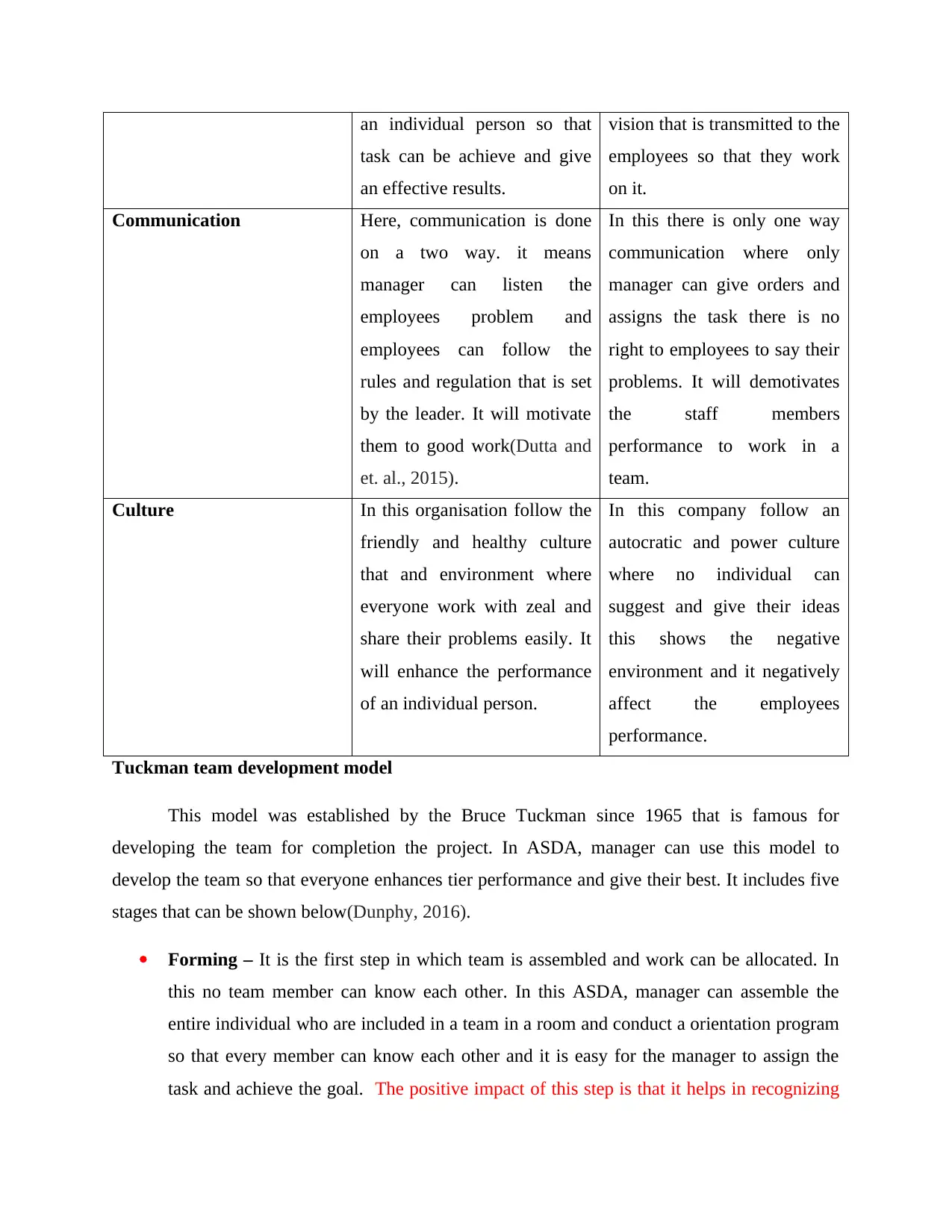
an individual person so that
task can be achieve and give
an effective results.
vision that is transmitted to the
employees so that they work
on it.
Communication Here, communication is done
on a two way. it means
manager can listen the
employees problem and
employees can follow the
rules and regulation that is set
by the leader. It will motivate
them to good work(Dutta and
et. al., 2015).
In this there is only one way
communication where only
manager can give orders and
assigns the task there is no
right to employees to say their
problems. It will demotivates
the staff members
performance to work in a
team.
Culture In this organisation follow the
friendly and healthy culture
that and environment where
everyone work with zeal and
share their problems easily. It
will enhance the performance
of an individual person.
In this company follow an
autocratic and power culture
where no individual can
suggest and give their ideas
this shows the negative
environment and it negatively
affect the employees
performance.
Tuckman team development model
This model was established by the Bruce Tuckman since 1965 that is famous for
developing the team for completion the project. In ASDA, manager can use this model to
develop the team so that everyone enhances tier performance and give their best. It includes five
stages that can be shown below(Dunphy, 2016).
Forming – It is the first step in which team is assembled and work can be allocated. In
this no team member can know each other. In this ASDA, manager can assemble the
entire individual who are included in a team in a room and conduct a orientation program
so that every member can know each other and it is easy for the manager to assign the
task and achieve the goal. The positive impact of this step is that it helps in recognizing
task can be achieve and give
an effective results.
vision that is transmitted to the
employees so that they work
on it.
Communication Here, communication is done
on a two way. it means
manager can listen the
employees problem and
employees can follow the
rules and regulation that is set
by the leader. It will motivate
them to good work(Dutta and
et. al., 2015).
In this there is only one way
communication where only
manager can give orders and
assigns the task there is no
right to employees to say their
problems. It will demotivates
the staff members
performance to work in a
team.
Culture In this organisation follow the
friendly and healthy culture
that and environment where
everyone work with zeal and
share their problems easily. It
will enhance the performance
of an individual person.
In this company follow an
autocratic and power culture
where no individual can
suggest and give their ideas
this shows the negative
environment and it negatively
affect the employees
performance.
Tuckman team development model
This model was established by the Bruce Tuckman since 1965 that is famous for
developing the team for completion the project. In ASDA, manager can use this model to
develop the team so that everyone enhances tier performance and give their best. It includes five
stages that can be shown below(Dunphy, 2016).
Forming – It is the first step in which team is assembled and work can be allocated. In
this no team member can know each other. In this ASDA, manager can assemble the
entire individual who are included in a team in a room and conduct a orientation program
so that every member can know each other and it is easy for the manager to assign the
task and achieve the goal. The positive impact of this step is that it helps in recognizing
⊘ This is a preview!⊘
Do you want full access?
Subscribe today to unlock all pages.

Trusted by 1+ million students worldwide
1 out of 19
Related Documents
Your All-in-One AI-Powered Toolkit for Academic Success.
+13062052269
info@desklib.com
Available 24*7 on WhatsApp / Email
![[object Object]](/_next/static/media/star-bottom.7253800d.svg)
Unlock your academic potential
Copyright © 2020–2026 A2Z Services. All Rights Reserved. Developed and managed by ZUCOL.



